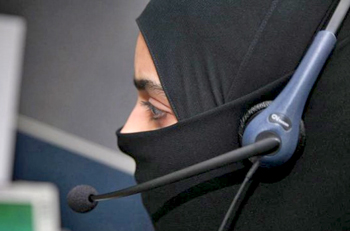Jeddah, Sep 21: The Ministry of Labor has warned it would punish companies hiring "ghost" women workers to boost their Saudization quotas, including heavy financial penalties, cutting off all services from the Human Resources Development Fund, and banning them from hiring new staff.
 The move comes as the ministry prepares to launch the third phase of its feminization campaign. This starts on Oct. 25 to include all stores with fewer than five workers and covering women’s perfumes, maternity wear, abayas, shoes, bags, clothes and fabrics.
The move comes as the ministry prepares to launch the third phase of its feminization campaign. This starts on Oct. 25 to include all stores with fewer than five workers and covering women’s perfumes, maternity wear, abayas, shoes, bags, clothes and fabrics.
Fahad bin Sulaiman Al-Takhifi, undersecretary and assistant for special programs at the ministry, said: “Any Saudi employee who cooperates with a company or institution to register as a ghost worker will be denied support for a period of three years for the first offense and five years for the second.”
“Companies will be fined between SR3,000 and SR10,000 for each illegal employee, and may be refused approval to renew iqamas and transfer services for employees,” he said.
Meanwhile, the director of the Khadijah bint Khuwaylid Women’s Center, Basmah Omair, said the third phase would create thousands of new jobs for women, and help reduce unemployment levels.
According to the Hafiz program, more than 1.5 million women are unemployed.
Abdullah Al-Maasoum, director of the Saudi Business Center, said the Labor Ministry should cancel the commercial licenses of employers who hire ghost workers. However, the rate of fake employment has fallen over the last three years, he said.
Speaking to Arab News, he said: "Several small and medium enterprises resorted to this fake employment of Saudis, to get more recruitment visas from the ministry. But starting from 2011, these companies stopped doing so to avoid being penalized."
Meanwhile, Saad Al-Asmari, a member of the youth business committee at the Jeddah Chamber of Commerce and Industry, told Arab News: "Several young Saudi workers should run their own business. However, many Saudis refuse to work at small enterprises that offer low monthly salaries. Therefore, it is hard to ensure a high rate of Saudization at these companies."
However, Rana Al-Mansour, a Saudi businesswoman, said she has succeeded in hiring more Saudi women at her clothes stores. "I have three branches in Jeddah. Ninety percent of my staff members are Saudi women. Most Saudi women will accept working in the private sector for salaries between SR3,000 and SR5,000."





Comments
Add new comment